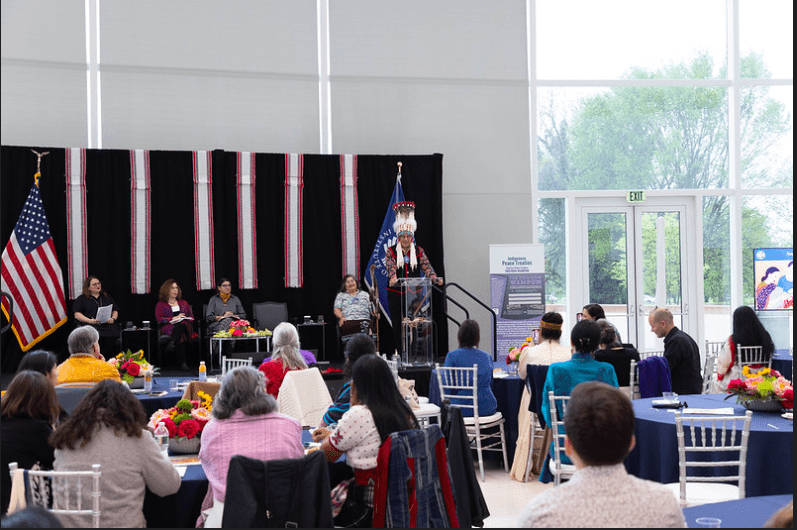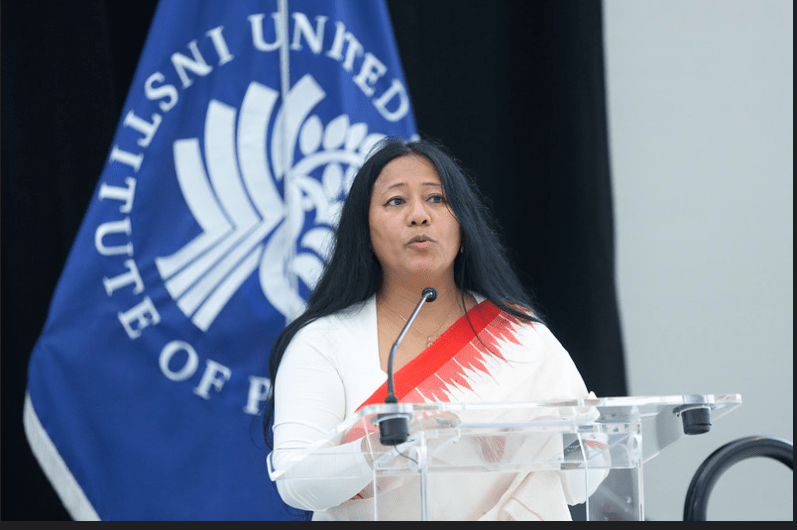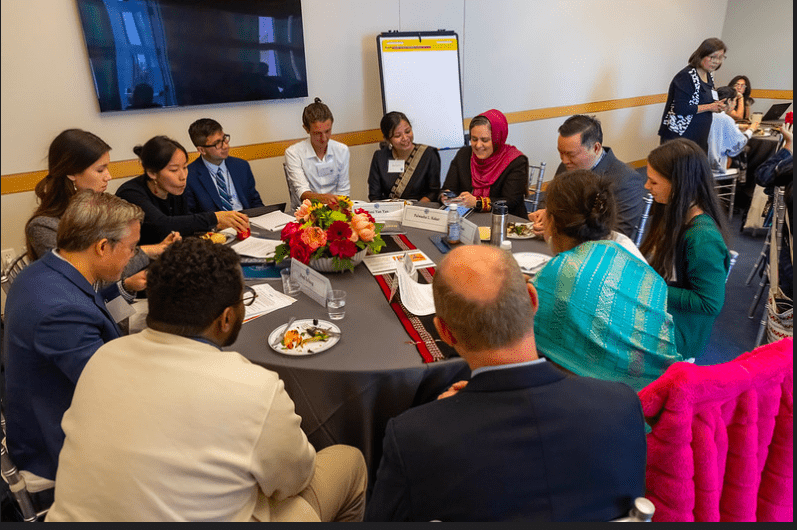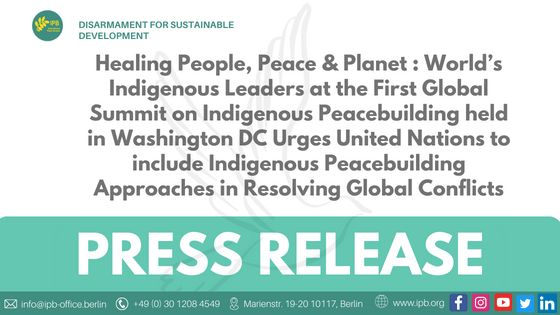FOR IMMEDIATE RELEASE
30 April 2024, Binalakshmi Nepram Mentschel
We live in a world marred by conflict. The world of today urgently needs meaningful peacebuilding that works for all. 80 percent of conflicts around the world are happening in biodiversity areas where Indigenous Peoples live.107 wars are happening in the world today, displacing 117 million. Any peace-building efforts in global conflicts must involve and include Indigenous Peoples. Peace-making efforts are currently usually negotiated at high political levels, behind closed doors, and with violent groups – where Indigenous Peoples are rarely represented.
50 Indigenous leaders from around the world, coming from 30 countries and territories met in April 2024 in Washington DC to foster broader understanding of the unique capacities and approaches that allow Indigenous Peoples to resist violence and build peace. This historic event helped develop recommendations to advance the inclusion of Indigenous Peoples in peace processes and establish a Global Network of Indigenous Peacebuilders, Mediators and Negotiators to mitigate and resolve violent conflict across borders.
The Summit also brought forth the Great Law of Peace of the Haudenosaunee People, the Peacetime Chiefs, the Treaty Elders, the Peace Dance, Olympic Truce, the Peace Pipe Treaties as well as Loiyunmba Shinyen, Indigenous forms of governance and constitution making that evolved in various parts of the world. Following the Summit, an International Declaration on Indigenous Peacebuilding was adopted which was signed by 50 Indigenous leaders, elders, women and youth from seven socio cultural regions of the world:
The Summit’s Inaugural session was graced by Wakerahkáhtste Louise McDonald Herne, Bear Clan Mother of the Mohawk National Council,US Secretary of the Interiors Debra Haaland, Lise Grande, President of United States Institute of Peace, Michael Orona, Senior Adviser for Global Strategy and International Indigenous Issues, US Department of State, Chief Wilton Littlechild from Confederacy of Treaty Six First Nations and Binalakshmi Nepram, Senior Adviser on Indigenous Issues at USIP. Maiia Ksenofontova, Pavel Sulyandziga and Donna Ngairangbam performed using Indigenous musical instruments and sung to invoke blessings and life. 6 panel discussions over two days saw rich discussions on issues facing Indigenous Peoples around the world and Indigenous approaches to peacebuilding.
Following the Summit, several of the Indigenous leaders participated in the 23rd Session of the United Nations Permanent Forum on Indigenous Issues and they read out statements on Indigenous Peacebuilding at the plenary assemblies during the period 15 April till 26 April. The Indigenous leaders who attended the Summit also met with the Office of the United Nations Under-Secretary for Political and Peacebuilding Affairs, Rosemary Dicarlo on 19 April and submitted the Declaration. The meeting was a truly memorable and an eventful one.
The outcome document of the 23rd Session of the UN Permanent Forum which was adopted on 26 April 2024 also included recommendations made at the Summit. Outcome document adopted on 26 April now contains 3 articles which were adopted at our Summit namely:
- The UN Permanent Forum on Indigenous Issues appoints 5 expert members to conduct a study entitled “Involvement of Indigenous Peoples in truth and reconciliation processes” and to present it to the Forum at its twenty-fourth session.
- The UN Permanent Forum on Indigenous Issues appoints 5 expert members to conduct a study entitled “Impact of colonization and armed conflicts on Indigenous Peoples’ rights: the imperative of peacebuilding” and to present it to the Forum at its twenty-fourth session.
- The UN Permanent Forum on Indigenous Issues calls upon Member States to address conflicts on Indigenous land and territories in meetings of the Security Council under the peace and security agenda, with the full and effective participation of Indigenous women and youth in peace processes. The Forum also recommends that the Department of Political and Peacebuilding Affairs actively monitor the implementation of peace accords involving Indigenous Peoples globally.
According to Organizers who coordinated efforts for the First Global Summit on Indigenous Peacebuilding which saw 120+ Indigenous peoples, organizations, and peace building community from around the world, who attended the Summit in person and online, “We have created history with the Summit. The inclusion of Summit recommendations in the outcome document showed that our work has made an impact. We have reminded UN and made the world realize the need to include Indigenous Peoples and Indigenous Peacebuilding to help heal people, peace, and planet. Indigenous territories should not be converted to war sites. The hard work now starts to materialize this on the ground where it matters but glad that we have made our first important historic step, and we will continue to nurture it in the days, months, and year to come.”
Photos are attached and for more details, please visit.
First Global Summit on Indigenous Peacebuilding | United States Institute of Peace (usip.org)
ENDS





